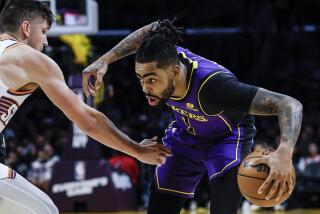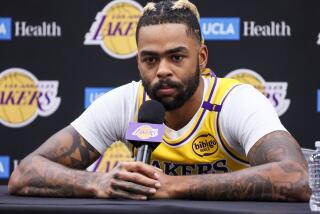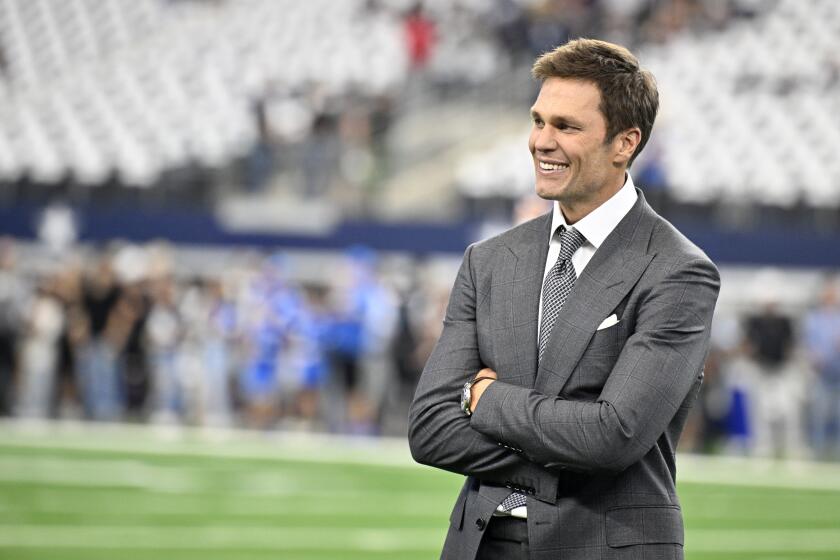HE’S GAME AGAIN FOR THE NBA : A Decade After Leaving, Russell’s Back, With Kings
SACRAMENTO — It’s a story Bill Russell never told himself, at least not for publication.
Not while he was winning 11 championships in 13 seasons as center for the Boston Celtics. Not while he was coaching the Seattle SuperSonics. Not while he was broadcasting National Basketball Assn. games for CBS and then Ted Turner.
But his daughter, Karen K. Russell, a recent graduate of Harvard Law School, wasn’t as reticent. Writing a first-person story in the New York Times Magazine, she told of the time the Russell family returned to their suburban Boston home from a long weekend to discover that they had been robbed.
“Our house was in a shambles and ‘NIGGA’ was spray-painted on the walls,” she wrote. “The burglars had poured beer on the pool table and ripped up the felt. They had broken into my father’s trophy case and smashed most of the trophies.
“I was petrified and shocked at the mess; everyone was very upset. The police came, and after a while, they left. It was then that my parents pulled back their bedcovers to discover that the burglars had defecated in their bed.”
Bill Russell, the new coach of the Sacramento Kings, stretched out his 6-foot 9-inch frame in the chair of his office here in the Arco Arena, his yellow golf cap still atop his head.
“I didn’t particularly like that part,” he said. “That might have revealed something about me.
“When I left Boston, I said I didn’t like it, but I didn’t say why.”
It was ironic, Karen Russell wrote, that she should return to Boston for her postgraduate studies. The racism she now encounters is not as overt as that her father knew, she wrote, yet its subtlety makes it perhaps even more insidious. And she is angry.
“The article was too close to me,” Bill Russell said. “All the things she wrote about, we talked about.
“I’m proud of the fact she has a social conscience. I tried to raise my kids to be independent and think for themselves, not to think like I think.”
Would it have been possible to be a child of Bill Russell and not have a social conscience?
“My children had access to most material things,” he said. “They didn’t have to care. It would have been very easy not to do anything.”
Instead, Karen has graduated from law school and is taking public stands. Russell shuffled through the pile of papers on his desk until he found a letter from his son, Jacob. Enclosed was Jacob’s degree from the Art Institute of Chicago. A third child, William Fenton II, is in restaurant management in Seattle.
“I’m proud of all of my children,” Russell said. “All of them have had quality educations. One of the things I tried to teach them was to be able to deal within the system.”
Now, at 53 and with all of his children grown, Russell is returning to a system from which he walked away in disgust 10 years ago. Last April, he signed a seven-year contract with the Kings, which stipulates that Russell will eventually ascend from coach to general manager to, ultimately, president of the franchise. That would make him the first black to reach such heights in professional sports.
Coincidentally, the night that Russell met in his Seattle home with Kings owner Gregg Lukenbill and team President Joe Axelson and agreed to come to Sacramento, was the same night Dodger Vice President Al Campanis made his “necessities” remark to “Nightline’s” Ted Koppel.
“The two things don’t have much to do with each other, although I read in the papers that they did,” Russell said, unleashing one of his trademark room-shaking laughs.
Did he attach special significance to becoming the first black team president?
“No,” he said. “When I was coaching the Celtics, someone asked me how important it was to be the first black coach. I said it would be important only when black coaches are hired and fired just like anyone else and nobody notices.
“I think about (becoming president), more so than being black, as being an ex-player. You know the song, ‘Look What They’ve Done to My Song, Ma?’ I’m pleased with what they’ve done with my game.
“I’ve talked to some of the players: Magic (Johnson), Larry (Bird), (Akeem) Olajuwon, Isiah (Thomas). I tell ‘em it makes me proud to be an ex-NBA player, the way they conduct themselves and the way they play.”
Bill Russell laughs at the idea that he’s returning to the NBA. To his way of thinking, he has never been away.
“What baffles me is why anyone would be surprised that I’m going to coach,” he said. “I like coaching.”
Like coaching? This is the same man who wrote in his autobiography “Second Wind,” that on the last day of his final season, 1976-77, as Seattle coach and general manager, “I was as relieved as a GI coming home from war.”
In Russell’s first season in Seattle, the team improved by 10 games. The SuperSonics made the playoffs for the first time in their history the next season, and won 43 and 40 games in his last two seasons. Yet with a year remaining on his contract, Russell bailed out of Seattle, the situation having deteriorated to the point where he and his players were not speaking with one another.
Russell bemoaned the absence of craftsmen in the game, the lack of self-motivation, the fragility of egos, his inability to treat the players the way he wanted to: telling the truth to their faces. Two seasons after he left, the SuperSonics won the NBA title.
Blaine Johnson, a reporter who covered the team when Russell was coach, said that if you had asked Russell on his last day whether he’d ever coach again, Russell would have bet you money that he wouldn’t.
“With Russell, you’re dealing with a guy who’s won a thousand championships, who’s probably one of the best centers to play in the league,” Fred Brown, who played for Russell in Seattle, told S.L. Price of the Sacramento Bee.
“You’re dealing with a guy who has his own image and own ego, and he’s dealing with guys who didn’t earn that respect of a champion, players with their own little egos. It was tough.”
Johnson, now assistant managing editor of the Tacoma (Wash.) News-Tribune, wrote a book about Russell’s Seattle teams. He said Russell envisioned building an organization much like the one he knew in Boston under Red Auerbach.
Wrote Johnson: “When that didn’t happen, No. 1, he became very frustrated, and No. 2, he didn’t have the coaching ability to say, ‘I don’t have a bunch of Celtics here, I have to find another combination of players.’ ”
All the buttons that Russell thought he could push, Johnson said--”the work ethic, accountability, competitiveness, fear of failure”--did not exist on the SuperSonics. This was a time, remember, when no-cut contracts were a way of life in the NBA, salaries were inflated because of the rivalry with the American Basketball Assn., and drug problems were on the rise.
“By the end, it was virtually Russell against the world,” Johnson said.
And yet, a decade later, Russell is returning to take another shot, even though he had a year remaining on his broadcasting contract with cable station TBS. Why?
“I’m in a different place in my life personally,” Russell said. “For one, I really genuinely like pro basketball. My kids are all on their own, I live by myself and I don’t have another job. I don’t have anything to do but this, and this, so far, is fine.”
Ask him about Seattle and he says: “What happened is that it was very hard to work there. I was getting a lot of things done, but it was such a struggle I basically got tired of the situation. I wasn’t mad at anybody when I left there.”
The communication breakdown? “It had to do a lot with me as much as (the players). Probably more with me.
” . . . I’m not as hard as I was then. I’m still hard, but not as hard as I was.”
Russell said he enjoys a good relationship with many of his former players.
“Most of them recognized that the things I was telling them--that were at the time shocking--now they see those things as the unvarnished truth. That’s something most athletes in this country don’t come face to face with a great deal in their careers.”
Russell dismisses the suggestion that his term in Seattle was a failure.
“What I did over four years was to take a team that was in disarray and put it on solid footing,” he said.
But why is he willing to start from near-bottom again with the Kings, a team that lost 53 games last season, including the memorable defeat in Los Angeles when they spotted the Lakers the first 29 points of the game and trailed, 40-4, after one quarter?
“I heard about that,” Russell said. “You’re talking about a lottery team that’s bad playing what I think is one of the top five teams ever to play. When a great team is playing against a bad team, anything can happen.”
In this case, what happened was that the coach, Phil Johnson, was fired within a week. Lukenbill, a hard-driving real estate developer who brought the Kings to Sacramento, is building a new arena, and plans a multipurpose sports complex that presumably will attract pro teams from other sports, would not stand for such a travesty.
“It wasn’t the 40-4,” team President Axelson said. “It was how it happened. Eight or 10 open layups, stuffs that were uncontested. You just can’t do that. That was what broke the camel’s back.”
It wasn’t long afterward--the Kings had appointed Jerry Reynolds as interim coach--that Russell called Axelson, a longtime friend, for advice. An East Coast team was interested in hiring Russell as coach. Axelson, who has known Russell from the time Axelson was general manager of the Cincinnati Royals, advised against it.
“So I said to Joe, ‘How long are you going to be in Sacramento,’ ” Russell said. “He told me, ‘A couple of years.’ I said, ‘Well, that’s the job I want.’
“We both laughed, but then he said, ‘That’s not impossible. That’s not that farfetched. Why don’t we talk again in a week?’ ”
In the interim, Axelson devised what he called his “stair-step” offer, in which Russell started out as coach and then worked his way up the corporate ladder.
“The hook for me was to get him to coach,” Axelson said. “I didn’t want him to become GM immediately. I wanted him to coach, to put his stamp on this team for three or four years, until it was playing well. After that, I don’t care what he does, but he needs to coach this team.”
It didn’t surprise him, Axelson said, that Russell was willing to coach.
“Not at all,” Axelson said. “He’s at the right age to want to do something major one more time. I wasn’t surprised, though it’s easier to say that to explain it.”
Russell said he’d thought about coaching again for the last two or three years. It was possible, Axelson said, that Russell grew weary of the wide criticism he absorbed as a broadcaster.
Russell met with Lukenbill and Axelson at his father’s home in Oakland, then once more in Seattle. To say that Lukenbill was sold would be an understatement. Eventually, Lukenbill said, Russell will have the chance to buy into the team.
“I’d be proud to be his partner,” Lukenbill said.
“He was successful in Boston, reasonably successful in Seattle and we anticipate he’ll be successful in Sacramento. We think he’s a perfect match for the direction we’re going with the franchise.
“He’s seen the transformation of the game from the ‘50s through the ‘80s, and you can’t quantify that experience. He’s literally seen four decades of basketball--on the floor, coaching on the bench, and from the broadcasting booth. He’s been down a unique path.”
And Sacramento was a road to be taken, Russell decided, and he called Turner to tell him of his desire to be released from the last year of his TBS contract.
“I genuinely like and respect Turner a great deal,” Russell said. “He’s one of the best people in this society, I think. For example, he doesn’t just give lip service to being an equal opportunity employer. He is one.
“He was very gracious when I told him I was leaving.”
Sacramento’s training camp will open Friday. Rookie camp already has started, and a number of the King veterans reported early. Over the summer, Russell and his assistants, Willis Reed and holdover Reynolds, worked with the Kings’ big men.
What does Russell hope to accomplish?
“Be a championship team,” he said.
And how long will that take?
“I don’t know,” he said. “I really don’t.”
That’s one of the reasons he insisted on a long-term contract, he said, laughing. “In case of a worst-case scenario.”
Then, turning serious, he said: “One of the things I bring here is I know how to win and I know the things that keep a team from winning.”
Does he have the patience for a job that obviously will take some time?
“I had it then (in Seattle),” Russell said. “And I’m far more patient now than I was then.”
Russell shares a problem many former great players have as coaches, Axelson said.
“They’re just not tolerant,” Axelson said. “It’s all right to be intolerant of substandard effort, but you have to be tolerant of a player who is mediocre if he’s busting his tail.
“That’s a fine line Bill has to walk but I think he can. He can’t expect Joe Kleine to do things he could do because Kleine never will.”
In 1967, Bill Russell’s next-to-last season as player-coach, the Celtics were playing the St. Louis Hawks in Alexandria, La. Mister Charlie, as Russell called his father, drove all the way from California to take Russell’s grandfather--the Old Man, is what Russell called him--to the game, the first ever attended by the Old Man.
Afterward, Mister Charlie took the Old Man into the Celtic locker room.
Wrote Russell in “Second Wind”: “After a few minutes, we saw him standing not far away.
“Panic shot through both of us: The Old Man was crying. I thought he was having a heart attack; I had never seen him cry. We rushed over, feeling the awful choke of helplessness. Then, we both saw that he was not in pain. He was staring, as if stunned, transfixed by the sight of Sam Jones and John Havlicek in the shower nearby. My two teammates were busily lathering up and talking, oblivious to the Old Man’s emotion.
“ ‘What’s the matter, Papa?’ Mister Charlie asked anxiously.
“The Old Man looked up at us and made a slow pronouncement. ‘I never thought I’d live to see the day when the water would run off a white man onto a black man,’ he said, ‘and the water would run off a black man onto a white man.’ ”
So, Russell was asked, what would the Old Man think about his grandson becoming president of the Sacramento Kings?
“I would think my grandfather, after giving it some thought, would say: ‘That’s about right.’ ”
Russell laughed and laughed.
More to Read
Go beyond the scoreboard
Get the latest on L.A.'s teams in the daily Sports Report newsletter.
You may occasionally receive promotional content from the Los Angeles Times.










